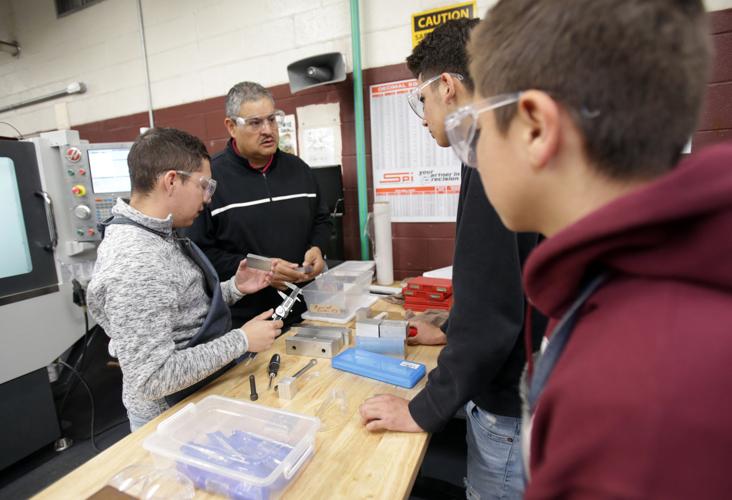Arizona’s major technology industries trade group got much of what it wanted from lawmakers last year, including renewed funding of state tax credits for “angel” investments and an extension of the state’s research and development tax credit.
This year, the Arizona Technology Council’s lobbying efforts will focus mainly on bolstering high school career and technical education (CTE) programs, while advocating for more support for K-12 schools and community colleges, said Steve Zylstra, president and CEO of the Tech Council.
The group is backing legislation to partially restore funding for the state’s Joint Technical Education Districts, which fund local vocational education programs, to allow students to enroll in career programs in their freshman year.
Students now can only start such programs in the 10th grade, limiting their choices early on and making it difficult to complete work for certain workplace certifications before they graduate.
Freshman year JTED funding was dropped in 2011 and efforts to restore it have failed in recent years.
This year, supporters are taking a more modest approach.
A bill introduced by Sen. Sylvia Allen, R-Snowflake, chair of the Senate Education Committee, would allow districts to enroll freshman students in CTE programs in five areas: agriscience, automotive technologies, construction, engineering and manufacturing.
That would obligate the state to add about $4 million in funding, compared with about $30 million to restore freshman-year funding across all 61 JTED programs, Zylstra said.
The legislation is backed by a diverse coalition of supporters.
Locally, Pima County JTED and area schools have worked with the Southern Arizona Manufacturing Partners (SAMP) to support programs that certify students and provide internships and jobs.
“For the Tech Council, it’s the engineering and manufacturing part that is critical,” Zylstra said, citing the state’s large aerospace industry.
Don Theriault, president of Tucson-based Industrial Tool, Die and Engineering and a founding member of SAMP, said getting students on a career track as early as possible is critical.
“It’s really important in the freshman year to get these kids engaged, to try and let them experiment,” said Theriault. “It doesn’t mean they have to be in a full-blown machining program but they can be taking a CAD (computer aided design) class their freshman year. They can learn some of those basic tools their freshman year.”
Starting in their sophomore year, Theriault said, students may graduate with one or two job certifications, like CAD drawing or manual machining, while starting in the freshman year could result in three or four certifications.
An internship program SAMP set up with JTED has helped fill a need for skilled entry-level workers, he said. Theriault’s company has hired eight JTED interns full time. Overall, about 50 interns have been placed in full-time positions with local companies over the last several years.
Pima County JTED offers 61 tuition-free CTE programs to more than 16,500 high school sophomores, juniors, and seniors each year at more than 40 locations, in 14 school districts throughout Pima County, Rio Rico, Nogales, and Mammoth-San Manuel.
As of 2016, 74 percent of students who completed a Pima JTED CTE program were working in industry, were enrolled in postsecondary education or joined the military, said Kathy Prather, deputy superintendent of Pima JTED.
Thousands of industry certifications and credentials were earned by Pima JTED students including certifications through the National Institute for Metalworking Skills, and the National Institute for Automotive Service Excellence, and certifications for emergency medical technicians, licensed nursing assistant, certified caregiver, medical assistant and physical therapy tech.
Prather said the areas targeted for restored ninth-grade funding are in high demand and tend to need more time for hands-on skill development.
“Understanding that budgets are tight and that we must be fiscally responsible, we are targeting the five career and technical education JTED programs where we can most positively impact the advancement of industry growth in Arizona,” she said.
Zylstra said the Tech Council supports a move by Gov. Doug Ducey to bring funding of the state’s three largest JTEDs to 100 percent under the state funding formula, after those districts funding had been cut to 95.5 percent.
The council also supports a Ducey budget proposal to add $371 million to school budgets for soft-capital needs, including classroom technology.
In addition to partially restoring JTED funding, the Tech Council would like to see the Legislature restore support of Arizona’s community colleges, whose state funding was dropped in 2015.
Though Ducey’s budget does not include funding for community colleges, Zylstra said he’s hopeful.
“There seems to be some legislative resolve to do something this year,” he said.
TAX CREDITS
AND TRAINING
Zylstra said the Tech Council isn’t proposing any legislative changes to tax credits supporting tech development but will be looking for support to tweak some existing programs.
Last year’s big win for the council came when lawmakers in the waning days of the session authorized an additional $10 million in tax credits against certain investments made in qualified small businesses through fiscal year 2021.
The tax credits are used by “angel” investors — individuals qualified to make private-equity investments by virtue of their high net worth or income.
An initial $20 million in angel credits was used up by mid-2015, and angel investments had plummeted as a result, backers said.
Recapitalizing the angel credits ran into opposition from some conservative lawmakers and groups including the Arizona Free Enterprise Club, who argued that the state should not be in the business of subsidizing private-equity investments.
Curtis Gunn, chairman of the local angels group, the Desert Angels, said membership is up and 2017 was the second biggest year in the group’s history, with members investing just over $6 million in 24 companies.
“Ninety-two percent of our investment dollars stayed in Arizona, which was significantly driven by the angel tax credits,” Gunn said.
Zylstra said the Tech Council is looking for ways to stretch another tax credit, which allows small companies to claim refundable research and development tax credits when they don’t have income to offset — a common situation with startups.
Small companies with 150 or fewer employees can get 75 percent of the normal credit as a refundable credit, lessening the state’s future liability, he said.
“The state gets rid of this ongoing obligation at a discount and the company gets cash when it needs it the most,” Zylstra said.
However, though the total refundable credits are capped at $5 million per year, there is no limit on how much one company can collect.
Zylstra said the Tech Council and the Arizona Commerce Authority are exploring ways to limit the credit one company can receive annually — spreading the benefits across more firms — without new legislation.





